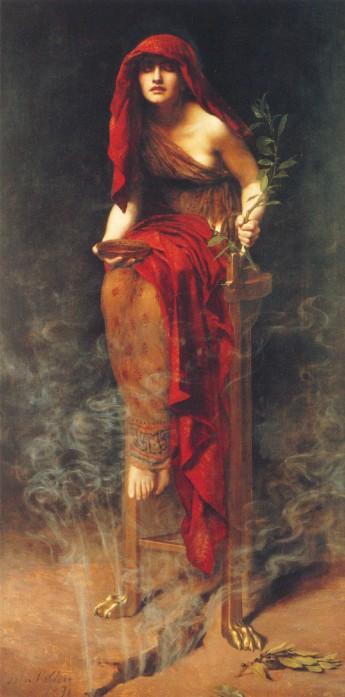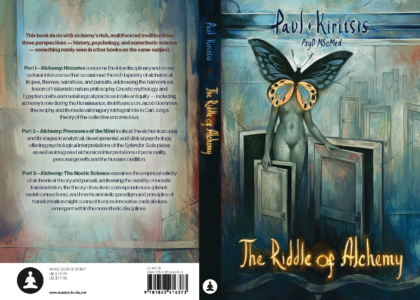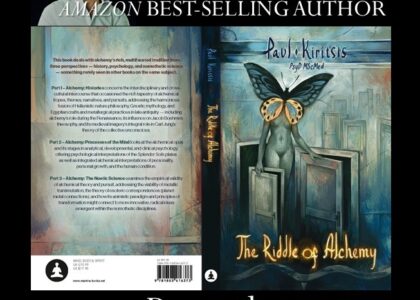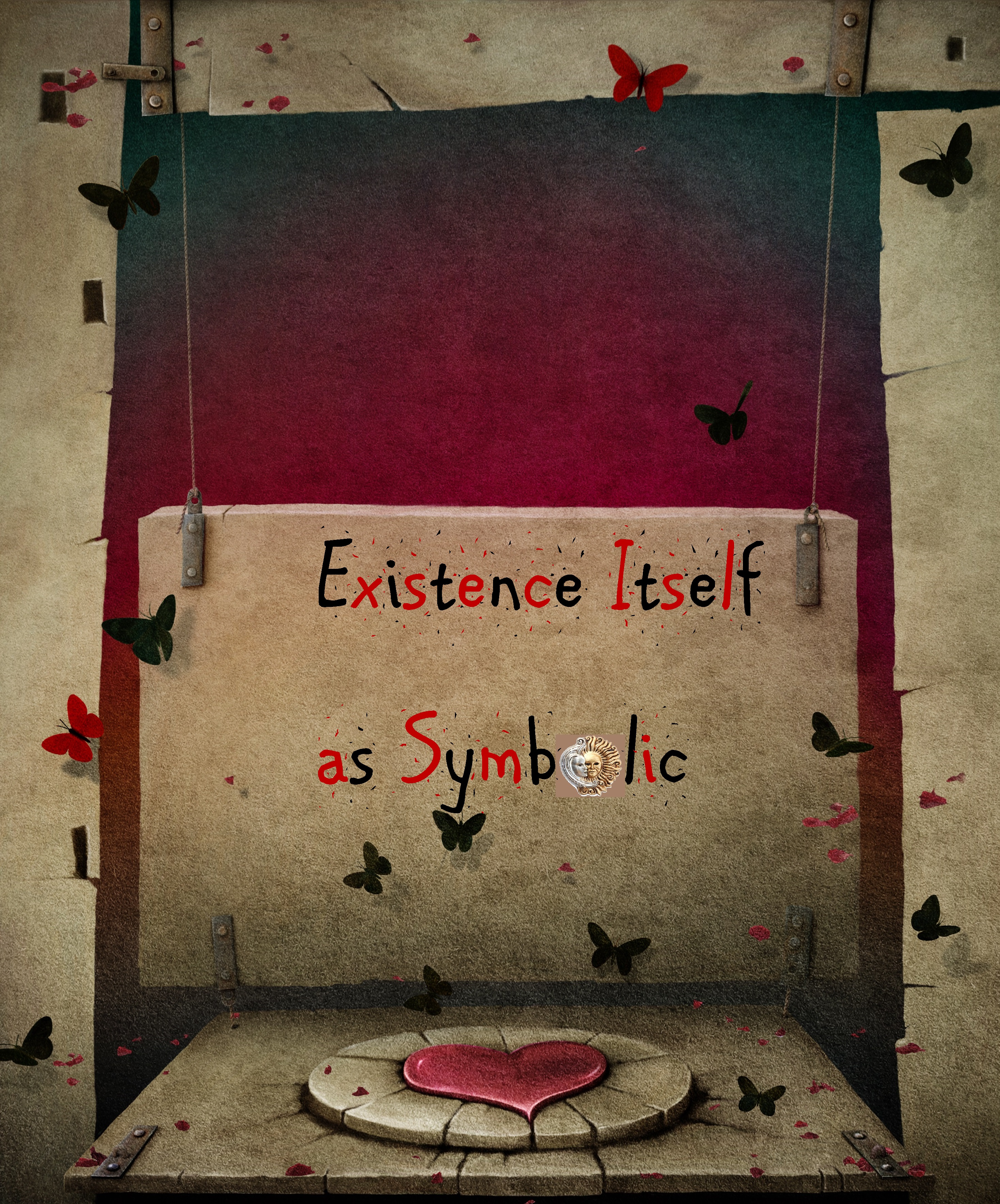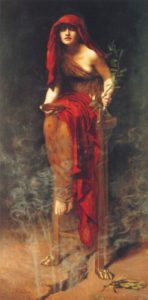
The landscape of ancient Greece as descried by classical myth and history brims with seers, fortune tellers and oracles. The most prestigious of these, the Oracle of Delphi, was built in a deep valley beside the chert-tiered limestone slopes of Mt. Parnassus in lower central Greece. Its builders expressed the rugged, raw, imaginative, superstitious and urgently fatalistic nature that so typified the ancient Greek mind and decreed Delphi to be the “omphalos”, the naval of the world. Many, many moons ago, Zeus released two eagles from Olympus, with one circumnavigating the world from the east and the other from the west. He decreed that the place of their reunion shall mark the “omphalos”. It just so happened that the two reunited beneath the star-crossed skies of Delphi, the same place where Apollo hid in a grotto to evade the wrath of his father Zeus for having slain the snake god Python. (A retributory act to honour his mother Leto who’d been pursued by the fiend after she fell pregnant to Zeus.)
It should come as no surprise to readers that Apollo was the patron deity of Dephi, for Apollo was the god who bestowed precognitive powers upon mortals. The god mimicked his physical, celestial counterpart, the sun, in that he was generally beneficent and virtuous, though he wasn’t immune from the shallow-minded and trivial narcissism that found expression through all the great Olympians. To give an example, Cassandra, daughter of King Priam and Queen Hecabe of Troy, was so beautiful that Apollo fell head over heels in love the minute he laid eyes upon her. He showered her with many gifts, one of which was the much desired talent of prophecy. Regrettably, the feeling wasn’t mutual and poor Cassandra suffered the detriment of his anger. Given that divine gifts could not be retracted once bequeathed to mortals, Apollo decreed that her predictions should always beach themselves along the shores of disbelief. Cassandra correctly predicted the fall of Troy, Agamemnon’s death at the hands of his scheming wife Clytemnestra, and the conspiracy to overthrow the city by means of a hollow wooden horse, but her omens fell on deaf ears.
The Oracle of Delphi, itself a place of worship that was circumscribed by strict procedures and rituals, practiced oracular divination on the seventh day of each month. Following the primordial tradition of the Egyptian priests and priestesses who washed themselves in the sacred pools of temples before enacting the tasks and rituals associated with the cult of each god or goddess, the high priestess of Delphi, the Pythia, bathed in the Castalian Spring before being allowed to sit on the holy tripod of the innermost sanctuary. The tripod itself was positioned over a fumarole or volcanic dyke as to facilitate mystical states of consciousness. Noxious, hallucinogenic gases emanating from the fissure below would disorientate the Pythia to a degree that enabled “the voice of Apollo” to possess her. Petitioners never received clear-cut responses to their questions; the Pythia’s utterances were painfully cryptic and obscure. To complicate matters further, she spoke in iambic pentameters.
Despite the Pythia’s vexing form of divination, her omniscience was not to be questioned. When Lysander, a Spartan general who helped defeat the Athenians at the Battle of Aegospotami in 405BCE consulted the Oracle of Delphi, he was warned to “guard against a roaring hoplite and a snake, cunning son of earth, which attacks behind the back.” Lysander was killed just outside the Boeotian city of Haliartus by a man holding a shield that was inscribed with the image of a snake. Alternatively, when the Roman Lucius Junius Brutus and two other men sought the aid of the Pythia she advised that “he among you who shall first kiss his mother will hold the highest power in Rome.” Brutus’s companions took the word “mother” literately; he, on the other hand, understood it as an allusion for Mother Earth. His companions went home and kissed their mothers whilst he settled for a cold and brittle kiss with the ground. It wasn’t long before he was rewarded for his mercurial mind and clever decipherment, for it was he that formed Rome’s first Council.
Classical literature relates the tale of the Swollen-Footed Oedipus who was condemned by an oracle at the time of his birth. A bad omen convinced his father, King Laius of Thebes, that it was best to desert the child to the fate of the natural elements, the daytime heat. Fortunately, or unfortunately perhaps, a shepherd took pity upon the deserted infant and hastened the infant Oedipus to Corinth where he was raised by the childless King Polybus and Queen Merope. Upon coming to adulthood, Oedipus began hearing rumours that he was not the biological son of the king and queen. All at sea with the mixed signals his parents gave him, he sought closure through prophecy. The Delphic Oracle wasn’t kind to him, issuing a rather ruthless and hostile decree that he should “mate with his own mother, and shed with his own hands the blood of his own sire.” These words shocked Oedipus to the extent that he fled from Corinth to Thebes without having ascertained whether or not he was the son of adopted parents, a necessary precursor if the bloodcurdling prophecy was to be fulfilled.
Knowledge of the past, future and things coming-to-be through divination could be sought through the Delphic Bee, the Pythia, or any other oracle in Greece. The enterprise so impressed the blind belief in fate on the hardening lava of consciousness that people often went about their lives passively, willingly surrendering themselves to the trinity of fates they called Moira, “the Fate of all Fates.” These all-encompassing, all-omniscient entities were unwavering in the decrees that they issued. Even the gods feared them. It was alleged that they would appear on the third night of a newborn’s birth and bestow a dowry and lifespan of sorts. They often made their presence felt in dreams, visions and through other unconscious means. All three shared the same basic physical characteristics–old in age with wrinkled skin and a veil made of spider webs that shrouded their facial features. The first of the triad was Clotho, the spinner, who wove the threads of each human life together. Lachesis, the apportioner, was the second and decided on how long the threads should be. The last fate Atropos, the inevitable, put an end to human life by cutting individual threads with her scissors. The conviction that all three worked their invisible hands on human destiny survived well into the twentieth century, a time when the prevailing religious current was Judeo-Christian and ran in a completely opposite course to the romantic fatalism of the ancient Greeks.
Now in order to understand the sentiments of the Judeo-Christian tradition, we must examine the central themes prevalent in Biblical Scripture. According to the Genesis creation narrative (Genesis 1-2), it took God or “Elohim” six days to mould the cosmos from the primordial substance. The use of the word “Elohim” is interesting, for in Hebrew it denotes “Gods”; not a single “God”. It was definitely a mistake in translation that would have enormous socio-political consequences for the disparate cultures which the three major monotheistic religions of the world–Judaism, Christianity and Islam–were to influence. After having called forth an entirely benevolent universe, the Yehovah-Elohim of a supplementary creation story proceeded to separate the earth from the heaven, circumscribe the path of the two great lights, the moon and the sun, and populate the primeval seas and land of the earth with living creatures.
The prospect of inhabiting an universe without a fellow Intellect didn’t appeal to God, so he added “Man” or Adam to his experimentation list and fashioned him in accordance to his own likeness. Woman or Eve was a secondary and inferior creation, having been made from Adam’s rib. Eve’s inferiority also indicated an overtly sexual and carnal nature that could be manipulated and easily led ashtray. Thus when Yehovah-Elohim planted a garden in Eden and commanded Adam and Eve not to eat of the fruit from the Tree of Knowledge which stood at its very centre, it was the latter that coerced the former to submit to the temptation generated by the Devil disguised as a tree serpent. The implications of their “Fall” from Paradise meant that they and their descendants would forever be marked by an Original Sin which found expression in the ravages of mortal existence. Knowledge of the divine was evil and the couple had been rudely evicted for wanting to “know”.
About fifteen centuries or so later, the early church fathers of late antiquity built upon the Judaic mythologem in asserting that the awaited Messiah, the mortal incarnation of God the Son promised in the Old Testament was none other than Jesus of Nazareth. The whole purpose of God incarnating in the flesh was to redeem the souls of “Fallen” descendants whose inherited Sin was the sole reason why humanity was gravitating further and further away from the Kingdom of God. Through the self-sacrificial act of Crucifixion, Jesus of Nazareth would shed light upon the path to a salvation which depended upon self-torment, obedience, humility, chastity and, among other thing, an absolute rejection of the part of ourselves that lives and dies like an animal. Sex, pleasure and anything else that gratified the ego was out.
This newfound dichotomy paved the way for the human race. There was the path of God, laid bare through Christ’s self-sacrifice and crucifixion, and the path of Satan, a malevolent force bent on destroying the souls of God’s favoured creation by leading them to depredation, sodomy, adultery and other unashamed pleasures of the selfish ego. Equipped with this dual knowledge of good and evil from the time of birth, each individual soul is free to choose their path. Thus, the Judeo-Christian tradition heavily stresses that choice is not predetermined and that we arrive at salvation or eternal damnation entirely through our own volition.
I will conclude today’s post with a free verse poem about free will.
A Gnostic Revelation
Who could ever comprehend Gnosis?
That experiential-knowledge word
About spiritual matters,
A meddling God and a slice
Of twinkling sky
Taunting me within the sanctuary
Of my mind as I lie
Sleepless every night
Because “you can’t remember
Your true purpose”
Says He whom ostracized
Us from the Garden of Eden
With fruits so ripe in serrated laws
And a will to suppress aching morality
By tyrannizing over our divine sparks,
Fragmented and serpent-like,
That shall only be kindled
By the fleshy meaning
Of one sinful kiss.

